
Francis Ford Coppola is an American film director, producer, and screenwriter. He is considered one of the major figures of the New Hollywood filmmaking movement of the 1960s and 1970s. Coppola is the recipient of five Academy Awards, six Golden Globe Awards, two Palmes d'Or and a British Academy Film Award (BAFTA).
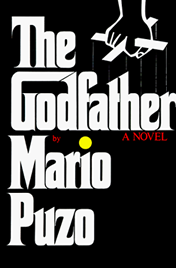
The Godfather is a crime novel by American author Mario Puzo. Originally published in 1969 by G. P. Putnam's Sons, the novel details the story of a fictional Mafia family in New York City, headed by Vito Corleone, the Godfather. The novel covers the years 1945 to 1955 and includes the back story of Vito Corleone from early childhood to adulthood.
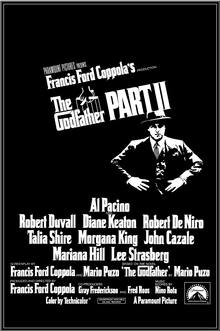
The Godfather Part II is a 1974 American epic crime film produced and directed by Francis Ford Coppola. The film is partially based on the 1969 novel The Godfather by Mario Puzo, who co-wrote the screenplay with Coppola, and it is both a sequel and a prequel to the 1972 film The Godfather, presenting parallel dramas: one picks up the 1958 story of Michael Corleone, the new Don of the Corleone family, protecting the family business in the aftermath of an attempt on his life; the prequel covers the journey of his father, Vito Corleone, from his Sicilian childhood to the founding of his family enterprise in New York City. The ensemble cast also features Robert Duvall, Diane Keaton, Talia Shire, Morgana King, John Cazale, Mariana Hill, and Lee Strasberg.
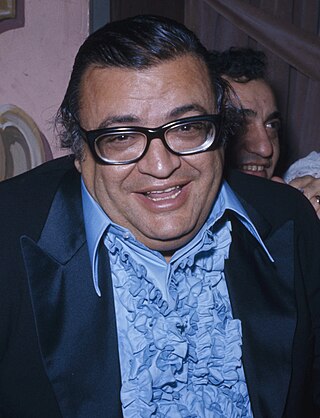
Mario Francis Puzo was an American author, screenwriter, and journalist. He is known for his crime novels about the Italian-American Mafia and Sicilian Mafia, most notably The Godfather (1969), which he later co-adapted into a film trilogy directed by Francis Ford Coppola. He received the Academy Award for Best Adapted Screenplay for the first film in 1972 and for Part II in 1974. Puzo also wrote the original screenplay for the 1978 Superman film and its 1980 sequel. His final novel, The Family, was released posthumously in 2001.
Bertram Harris Fields was an American lawyer noted for his work in the field of entertainment law. He represented many of the leading film studios, as well as numerous celebrities, and lectured at both Stanford and Harvard Law Schools. Fields was also a musician and an author of both fiction and non-fiction books.

The Godfather Part III is a 1990 American crime film produced and directed by Francis Ford Coppola from the screenplay co-written with Mario Puzo. The film stars Al Pacino, Diane Keaton, Talia Shire, Andy García, Eli Wallach, Joe Mantegna, Bridget Fonda, George Hamilton, and Sofia Coppola. It is the third and final installment in The Godfather trilogy. A sequel to The Godfather (1972) and The Godfather Part II (1974), it concludes the fictional story of Michael Corleone, the patriarch of the Corleone family who attempts to legitimize his criminal empire. The film also includes fictionalized accounts of two real-life events: the 1978 death of Pope John Paul I and the Papal banking scandal of 1981–1982, both linked to Michael Corleone's business affairs.

Michael Corleone is a fictional character and the protagonist of Mario Puzo's 1969 novel The Godfather. In the three Godfather films, directed by Francis Ford Coppola, Michael was portrayed by Al Pacino, for which he was twice-nominated for Academy Awards. Michael is the youngest son of Vito Corleone, a Sicilian immigrant who builds a Mafia empire. Upon his father's death, Michael succeeds him as the don of the Corleone crime family.
Albert Stotland Ruddy is a Canadian-American film and television producer. He is known for producing The Godfather (1972) and Million Dollar Baby (2004), both of which won him the Academy Award for Best Picture, as well as co-creating the CBS sitcom Hogan's Heroes (1965–1971).
The Godfather Saga is a 1977 American television miniseries that combines The Godfather and The Godfather Part II into one film. It originally aired on NBC over four consecutive nights in November 1977. The Godfather Saga is also known as The Godfather: The Complete Novel for Television, The Godfather: A Novel for Television, The Godfather Novella, The Godfather 1901–1959: The Complete Epic, and The Godfather Epic. The television version was the basis for a shorter, 1981 video release known as The Godfather 1902–1959: The Complete Epic. Following the release of The Godfather Part III in 1990, a third unified version was released to video in 1992 entitled The Godfather Trilogy: 1901–1980.
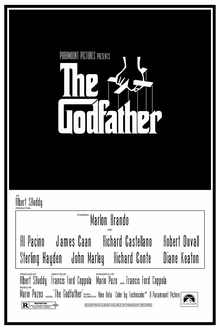
The Godfather is a 1972 American crime film directed by Francis Ford Coppola, who co-wrote the screenplay with Mario Puzo, based on Puzo's best-selling 1969 novel of the same title. The film stars Marlon Brando, Al Pacino, James Caan, Richard Castellano, Robert Duvall, Sterling Hayden, John Marley, Richard Conte, and Diane Keaton. It is the first installment in The Godfather trilogy, chronicling the Corleone family under patriarch Vito Corleone (Brando) from 1945 to 1955. It focuses on the transformation of his youngest son, Michael Corleone (Pacino), from reluctant family outsider to ruthless mafia boss.

Peter Clemenza is a fictional character who first appeared in Mario Puzo's 1969 novel The Godfather. He is played by Academy Award-nominee Richard Castellano in Francis Ford Coppola's 1972 film adaptation of the novel, and by Bruno Kirby in The Godfather Part II (1974).

The Godfather is the soundtrack from the film of the same name, released in 1972 by Paramount Records, and in 1991 on compact disc by MCA. Unless noted, the cues were composed by Nino Rota and conducted by Carlo Savina. The song "I Have but One Heart" is sung by Al Martino, who performed it in the film as character Johnny Fontane.

The Godfather's Revenge, a 2006 novel written by author Mark Winegardner, is the sequel to his 2004 novel The Godfather Returns. It is the fourth book in The Godfather novel series and is chronologically set last.

Cardinal Lamberto is a fictional character appearing in the 1990 film The Godfather Part III. He is portrayed by Italian actor Raf Vallone.
The Godfather is a trilogy of American crime films directed by Francis Ford Coppola inspired by the 1969 novel of the same name by Italian American author Mario Puzo. The films follow the trials of the fictional Italian American mafia Corleone family whose patriarch, Vito Corleone, rises to be a major figure in American organized crime. His youngest son, Michael Corleone, becomes his successor. The films were distributed by Paramount Pictures and released in 1972, 1974, and 1990. The series achieved success at the box office, with the films earning between $430 and $517 million worldwide. The Godfather and The Godfather Part II are both seen by many as two of the greatest films of all time. The series is heavily awarded, winning 9 out of 28 total Academy Award nominations.

The Family Corleone is a 2012 novel by Ed Falco, based on an unproduced screenplay by Mario Puzo, who died in 1999. It is the prequel to Puzo's The Godfather. It was published by Grand Central Publishing and released May 8, 2012. It is the fifth and final book published in The Godfather novel series but, being a prequel, it is chronologically set first.
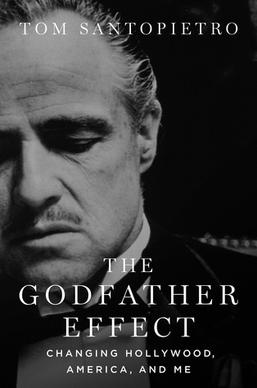
The Godfather Effect is a 2012 critically acclaimed study of The Godfather films – as well as Mario Puzo's 1969 novel – and their effect on American culture. Written by biographer Tom Santopietro, the book demonstrates how The Godfather was a turning point in American cultural consciousness. With its emphasis on proud ethnicity, The Godfather changed not just the way Italian-Americans saw themselves, but how Americans of all backgrounds viewed their individual and national self-identities, their possibilities, and attendant disappointments.
The Godfather book series is a series of crime novels about Italian-American Mafia families, most notably the fictional Corleone family, led by Don Vito Corleone and later his son Michael Corleone. The first novel, The Godfather, written by Mario Puzo, was released in 1969. It was adapted into a series of three feature films, which became one of the most acclaimed franchises in film history.

The Offer is an American biographical drama miniseries created by Michael Tolkin and developed by Tokin and Nikki Toscano for Paramount+. The series follows the development and production of Francis Ford Coppola's landmark gangster film The Godfather (1972) for Paramount Pictures. Miles Teller, Matthew Goode, Giovanni Ribisi, Colin Hanks, Dan Fogler, Juno Temple, and Burn Gorman all star. It premiered on April 28, 2022, and ran 10 episodes through June 16.














